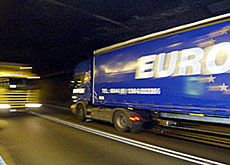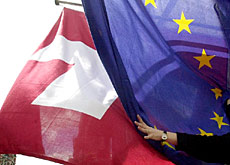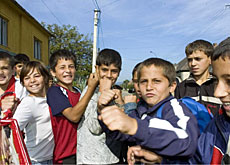EU challenge for Switzerland’s neighbour

On January 1, Switzerland's neighbour Austria assumes the presidency of the European Union from Britain.
Switzerland is as yet unsure how this development will affect the good relations it has traditionally enjoyed with its neighbour to the east.
Austria will hold the presidency for six months, before handing on the baton to Finland.
The legacy left by Britain is a difficult one. Although the EU managed to resolve its budget dispute just before Christmas, a range of problems remains.
The 58-page joint programme for 2006, which Austria and Finland presented in the week before Christmas, contained no mention of Switzerland.
Yet a good number of bilateral contacts are planned, starting on January 19 when Swiss President Moritz Leuenberger visits the chairman of the EU presidency, Austrian Federal Chancellor Wolfgang Schüssel. Switzerland’s European policy is expected to be one of the main topics of discussions.
Then on January 23 Foreign Minister Micheline Calmy-Rey will travel to Vienna for a meeting with her Austrian counterpart Ursula Plassnik.
In March Interior Minister Pascal Couchepin will take part in a conference on genetic engineering, while Leuenberger will revisit the country in April for a conference of transport ministers.
Austrian influence
Johann Bucher, the Swiss ambassador to Vienna, told swissinfo that relations with Austria were not crucial to Switzerland’s dealings with the EU. “Switzerland has its own relations with the European institutions,” he said.
But Bucher is convinced that Austria will support Switzerland during its presidency as it does normally.
For the Swiss ambassador it is no coincidence that it was during the last Austrian presidency that Switzerland finalised negotiations on the first round of bilateral accords.
The then foreign minister Schüssel had to apply considerable pressure to ensure the bilaterals were finally concluded.
Cohesion fund
Bucher said that Switzerland’s contribution to reduce economic and social inequalities in the enlarged EU through the cohesion fund was an issue that would extend beyond the Austrian presidency. “But it certainly can’t be said that the Austrians are dragging their feet over this.”
The problem lay much more with previous recipients of cohesion funds who were unwilling to give up their share, said Bucher.
Once the issue of the cohesion contribution has been resolved Switzerland will be able to conclude the bilateral accords with the EU which have already been approved by Swiss voters in a referendum. And only then can negotiations start on a planned bilateral power agreement.
Transalpine traffic
Austria and Switzerland both want to see transalpine traffic brought into conformity with the interests of the environment and the people.
Bucher says both sides have to make efforts to find arrangements which strike a balance between allowing goods vehicles free access and protecting the local population and environment.
The EU is concerned that the increase in the tax on heavy goods vehicles in Switzerland could result in more transalpine traffic in France and Austria.
But Bucher points out that Switzerland pays for its road and rail axes itself. By contrast the planned Brenner base tunnel between Austria and Italy will be partly financed by the EU.
Moreover Switzerland’s heavy goods vehicle tax affects above all domestic vehicles, with only ten per cent of tax revenue coming from transit vehicles. The situation at the Brenner will be quite different, Bucher says.
“There it will be mainly foreign vehicles that are taxed,” he said.
swissinfo, Etienne Strebel
Various problems between Switzerland and the EU remain to be resolved in 2006:
The internal EU quarrel over the voluntary Swiss contribution to the cohesion fund for new EU member states.
The finalising of the bilateral accords and the implementation of the Schengen accord.
The increased tax on heavy goods vehicles in Switzerland and the feared increase in transalpine traffic in Austria and France.
The creation of a joint bureau to monitor transalpine traffic.
The opposition of the EU Commission to the tax policies in some cantons.
Over the course of the next six months, Austria wants to relaunch the debate on the future of the European Union.
Another theme of the Austrian presidency will be EU relations with the former Yugoslav republics, and in particular negotiations over the future status of the Serbian province of Kosovo.

In compliance with the JTI standards
More: SWI swissinfo.ch certified by the Journalism Trust Initiative


You can find an overview of ongoing debates with our journalists here. Please join us!
If you want to start a conversation about a topic raised in this article or want to report factual errors, email us at english@swissinfo.ch.